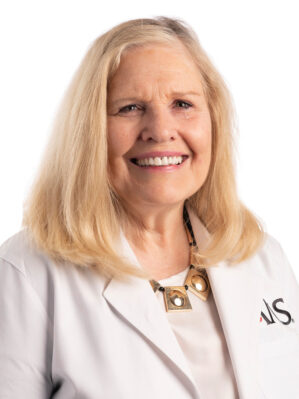
When Betty Everett, Ph.D., retires June 30th, she will leave behind more than just treasured memories. After 20 years of dedicated service to the patients, staff and students of the UAMS Department of Psychiatry, Everett will leave a mark on the UAMS Psychiatric Research Institute and those it serves that cannot be erased.
Everett began her career at UAMS in 1989, serving as the Division of Child and Adolescent Psychiatry’s lead psychologist with its inpatient unit, then at Arkansas Children’s Hospital. She left UAMS to enter private practice along with stints at The Bridgeway and a position at the Centers for Youth and Families. G. Richard Smith, M.D., who became chairman of the Department of Psychiatry in 2001, reached out to Everett in 2003 in an effort to fill a dual role, working with women in Arkansas CARES, a residential substance abuse treatment program, and treating adults at a UAMS clinic based at the Blandford Building. The opportunity to expand her work with trauma patients of all ages was enough to convince Everett to return to UAMS.
“My whole career has been focused in dealing with traumatic stress in our population,” said Everett, the current director of the Psychiatric Research Institute’s Center for Trauma Prevention, Recovery and Innovation. While in graduate school at Oklahoma State University in Stillwater, Everett worked at a parenting center in Oklahoma City and volunteered her services to a program involving childhood cancer patients. “Trauma has always been there in the people that I’ve served.”
One of the first things she did once she returned to UAMS and the Department of Psychiatry was develop a support program for traumatic stress patients. The opening of the Psychiatric Research Institute in 2008 allowed Everett to expand her clinical role, conducting group therapy sessions for women with post-traumatic stress disorder. ”We were fortunate enough to see a lot of patients respond to psychotherapy and interventions. I like to see people reclaim their lives,” said Everett.
She also instituted a training program utilizing dialectical behavior therapy (DBT), a type of cognitive behavioral therapy that teaches patients skills to cope with, and change, unhealthy behaviors. One of the first in Arkansas to employ this evidence-based psychotherapy, Everett says at least five members of the Psychiatric Research Institute’s psychotherapy staff are currently using the therapy to treat patients.
The Center for Trauma Prevention, Recovery and Innovation, a multidisciplinary program designed to promote the growth and recovery for people who have experienced trauma, was launched in 2019. With Everett at the helm, the center has seen the Psychiatric Research Institute and UAMS recognize the need for precise diagnoses and treatment of victims of mental, emotional and physical trauma. “I feel really good about what we’ve been able to do. We’ve seen incredible growth at the Psychiatric Research Institute and UAMS in terms of awareness about trauma and the quality of care that’s provided,” said Everett.
Everett is looking forward to a less hectic schedule once she retires, even though she will remain in an adjunct faculty position. Along with maintaining a small private practice, she will continue to work with the Arkansas Psychology Association. As the group’s current president, she is working with a task force exploring the impact of poverty on the state’s population.
Her plans for the future include extended travels with her husband, Ken Hebert, but Everett admits she will miss her day-to-day experiences with the students and staff of the Psychiatric Research Institute. “I’ve enjoyed watching people learn and watching this place grow. It’s been my heart and my home for a while.”
